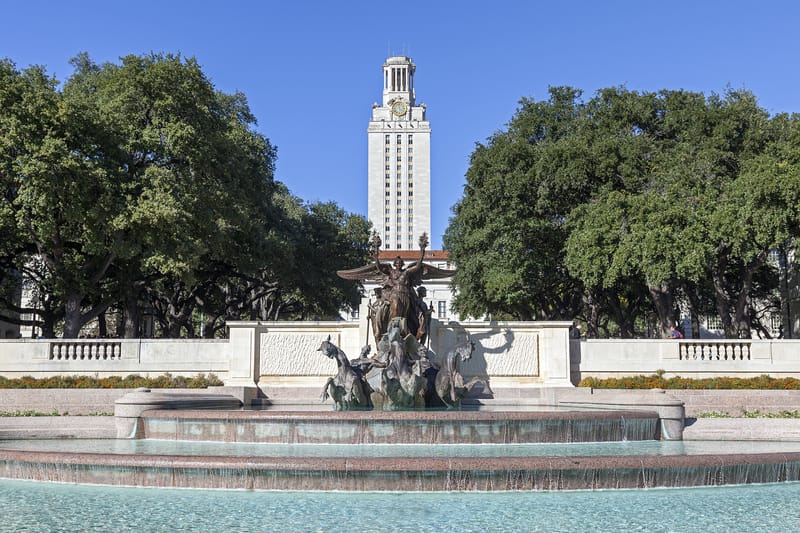- Calls to this hotline are currently being directed to Within Health, Fay or Eating Disorder Solutions
- Representatives are standing by 24/7 to help answer your questions
- All calls are confidential and HIPAA compliant
- There is no obligation or cost to call
- Eating Disorder Hope does not receive any commissions or fees dependent upon which provider you select
- Additional treatment providers are located on our directory or samhsa.gov
University of Texas Eating Disorder Counseling and Support
Here are some mental health services for University of Texas students that might be struggling with an eating disorder or other mental health-related issues:

Counseling and Mental Health Center
The Counseling and Mental Health Center (CMHC) at the University of Texas offers confidential counseling and psychiatric services to help students manage a variety of mental health concerns, including eating disorders. They provide individual counseling, group therapy, workshops, and support groups to help students build coping skills and improve their well-being.
Contact Information:
- Address: 100 W. Dean Keeton Street, Austin, TX 78712
- Phone: Crisis Line: 512-471-2255
- Website: https://cmhc.utexas.edu/
Mindful Eating Groups
The CMHC (Counseling and Mental Health Center) offers a range of confidential groups to University students at no cost. Among these is the Mindful Eating group, which meets weekly and is designed to foster a supportive community where students can explore their relationship with food and their body. The group is open to all students, including those currently undergoing treatment or diagnosed with an eating disorder. In a nonjudgmental environment, participants can examine how disordered eating thoughts and behaviors may affect various aspects of their life. Students are encouraged to bring their lunch to the session and to take advantage of the confidential space created by the group.
Contact Information:
- Address: 100 W. Dean Keeton Street, Austin, TX 78712
- Website: https://cmhc.utexas.edu/groups.html
UT Nutrition Institute
The UT Nutrition Institute offers nutrition counseling, education, and research to the UT community. They can provide support and guidance to students with eating disorders, as well as resources and information about healthy eating habits.
Contact Information:
- Email: hello@utnutritioninstitute.org
- Website: https://utni.org/
The MindBody Labs
The MindBody Labs offer a flexible and self-directed environment that allows University of Texas students to access resources for enhancing their physical and emotional well-being. These labs provide students with audio and video instruction on a diverse range of topics that are experiential in nature. This means that students can engage in the material hands-on, following along with the instructions and practicing the skills as they are being taught.
Contact Information:
website: https://cmhc.utexas.edu/mindbodylab.html
Texas Athletics Nutrition Services (for Athletes)
Texas Athletics Nutrition Services provides nutrition counseling and education to help athletes develop healthy eating habits and improve their performance. They can also provide support and guidance to athletes who may be struggling with disordered eating or other eating disorders.
Contact Information:
- Address: 433 East 23rd Street, 6th floor of the North End Zone
- Website: https://texassports.com/sports/2013/7/24/facilities_0724134436.aspx
About University of Texas
The University of Texas at Austin, commonly known as UT Austin, is a prestigious public research university renowned for its academic excellence and impactful research contributions. With a sprawling 437-acre campus located in the heart of Austin, Texas, the university offers state-of-the-art facilities, extensive libraries, and leading research centers to support a diverse range of academic programs. UT Austin’s diverse and inclusive community attracts students from various backgrounds and interests, providing a vibrant and engaging campus environment. With over 1,300 student organizations, NCAA Division I sports teams, and a lively arts and cultural scene, the university offers students an immersive and enriching college experience. Its commitment to fostering innovation, creativity, and social impact makes the University of Texas at Austin a sought-after destination for aspiring scholars and leaders.
Quick Tip
Recognize the Signs of an Eating Disorder
Eating disorders can affect anyone, including college students. The transition to college life can bring about numerous changes and challenges, making it crucial to recognize the signs of eating disorders early on. Understanding these disorders and their common warning signs can help you or someone you know seek the necessary support and treatment.
Common Warning Signs:
- Drastic Weight Changes: Sudden and unexplained weight loss or gain can be a red flag. Pay attention if a friend’s eating habits result in a significant change in their body weight.
- Preoccupation with Food, Calories, and Dieting: Constantly talking about diets, calories, or fat content in foods can indicate an unhealthy obsession with food.
- Social Withdrawal: Students with eating disorders may withdraw from social events that involve food, making excuses to avoid meals with friends.
- Excessive Exercise: Engaging in intense exercise routines regardless of physical exhaustion or injury can be a warning sign of an eating disorder.
- Frequent Bathroom Trips: If someone frequently disappears to the bathroom after meals, it may be a sign of purging behaviors.
- Changes in Appearance: Noticeable changes in hair, skin, and nails, as well as the appearance of fine hair on the body (lanugo), can result from malnutrition in eating disorders.
- Mood Swings: Rapid mood swings, depression, or increased irritability can be linked to the physical and emotional strain of an eating disorder.
Recognizing the signs of eating disorders is the first step toward seeking help. If you or someone you know shows these warning signs, it’s important to reach out to a trusted friend, family member, or a campus counselor. Eating disorders are treatable, and early intervention can make a significant difference in recovery.
Remember, you don’t have to face this challenge alone. Seeking help and support is a sign of strength, and there are resources available both on and off campus to help college students overcome eating disorders and lead healthier, happier lives.

